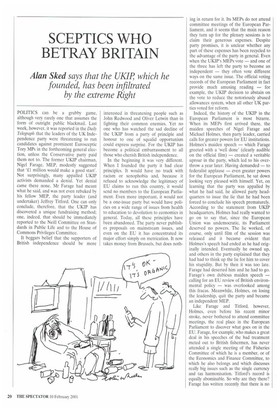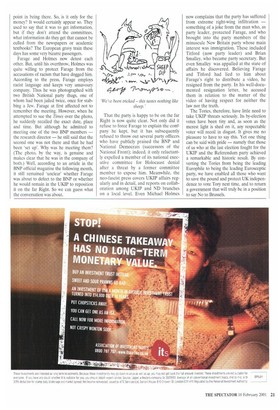SCEPTICS WHO BETRAY BRITAIN
Alan Sked says that the UKIF; which he
founded, has been infiltrated by the extreme Right
POLITICS can be a grubby game, although very rarely one that assumes the form of outright public blackmail. Last week, however, it was reported in the Daily Telegraph that the leaders of the UK Independence party were threatening to run candidates against prominent Eurosceptic Tory MPs in the forthcoming general election, unless the Conservative party paid them not to. The former UKIP chairman, Nigel Farage, MEP, modestly suggested that 11 million would make a good start'. Not surprisingly, many appalled UKIP activists demanded a denial. Yet denial came there none. Mr Farage had meant what he said, and was not even rebuked by his fellow MEP, the party leader (and undertaker) Jeffrey Titford. One can only conclude, therefore, that the UKIP has discovered a unique fundraising method; one, indeed, that should be immediately reported to the Neill Committee on Standards in Public Life and to the House of Commons Privileges Committee.
It beggars belief that the supporters of British independence should be more interested in threatening people such as John Redwood and Oliver Letwin than in fighting their common enemies. Yet no one who has watched the sad decline of the UKIP from a party of principle and honour to one of squalid opportunism could express surprise. For the UKIP has become a political embarrassment to all those who cherish British independence.
In the beginning it was very different. When I founded the party it had clear principles. It would have no truck with racism or xenophobia and, because it refused to acknowledge the legitimacy of EU claims to run this country, it would send no members to the European Parliament. Even more important, it would not be a one-issue party but would have policies on a wide range of issues from health to education to devolution to economics in general. Today, all these principles have been abandoned, The party never publishes proposals on mainstream issues, and even on the EU it has concentrated its major effort simply on metrication. It now takes money from Brussels, but does noth
ing in return for it. Its MEPs do not attend committee meetings of the European Parliament, and it seems that the main reason they turn up for the plenary sessions is to claim their generous expenses. Despite party promises, it is unclear whether any part of these expenses has been recycled to the advantage of the party in general. Even when the UKIP's MEPs vote — and one of the three has left the party to become an independent — they often vote different ways on the same issue. The official voting records of the European Parliament in fact provide much amusing reading — for example, the UKIP decision to abstain on the vote to reduce the notoriously abused allowances system, when all other UK parties voted for reform.
Indeed, the history of the UKIP in the European Parliament is most bizarre. When its MEPs first arrived there, the maiden speeches of Nigel Farage and Michael Holmes, then party leader, carried calls for greater powers for EU institutions. Holmes's maiden speech — which Farage greeted with a 'well done' (clearly audible on the official film) — created a veritable uproar in the party, which led to his overthrow a year later. Having demanded — to federalist applause — even greater powers for the European Parliament, he sat down looking very pleased with himself. Yet, on learning that the party was appalled by what he had said, he allowed party headquarters to issue the lie that he had been forced to conclude his speech prematurely. According to the statement from UKIP headquarters, Holmes had really wanted to go on to say that, since the European Union was undemocratic, its Parliament deserved no powers. The lie worked, of course, only until film of the session was released and it became evident that Holmes's speech had ended as he had originally intended. Eventually he owned up, and others in the party explained that they had had to think up the lie for him to cover his stupidity. But by then it was too late. Farage had deserted him and he had to go. Farage's own dubious maiden speech — calling for an EU review of British environmental policy — was overlooked among this fracas. Meanwhile, Holmes, on losing the leadership, quit the party and became an independent MEP.
Like Farage and Titford, however, Holmes, even before his recent minor stroke, never bothered to attend committee meetings, the real place in the European Parliament to discover what goes on in the EU. Farage, for example, who makes a great deal in his speeches of the bad treatment meted out to British fishermen, has never attended a single meeting of the Fisheries Committee of which he is a member, or of the Economics and Finance Committee, to which he also belongs and which discusses really big issues such as the single currency and tax harmonisation. Titford's record is equally abominable. So why are they there? Farage has written recently that there is no point in being there. So, is it only for the money? It would certainly appear so. They used to say that it was to get information, but if they don't attend the committees, what information do they get that cannot be culled from the newspapers or academic textbooks? The European gravy train these days has some very bizarre passengers.
Farage and Holmes now detest each other. But, until his overthrow, Holmes was quite willing to protect Farage from the accusations of racism that have dogged him. According to the press, Farage employs racist language and keeps very unsavoury company. Thus he was photographed with two British National party thugs, one of whom had been jailed twice, once for stabbing a Jew. Farage at first affected not to remember the meeting. However, when he attempted to sue the Times over the photo, he suddenly recalled the exact date, place and time. But although he admitted to meeting one of the two BNP members — the research director — he still said that the second one was not there and that he had been 'set up'. Why was he meeting them? (The photo, by the way, is genuine and makes clear that he was in the company of both.) Well, according to an article in the BNP official magazine the following month, it still remained 'unclear' whether Farage was about to defect to the BNP or whether he would remain in the UKIP to reposition it on the far Right. So we can guess what the conversation was about.
That the party is happy to be on the far Right is now quite clear. Not only did it refuse to force Farage to explain the com*pany he kept, but it has subsequently refused to throw out several party officers who have publicly praised the BNP and National Democrats (successors of the National Front); indeed, it only reluctantly expelled a member of its national executive committee for Holocaust denial after a threat by a former committee member to expose him. Meanwhile, the neo-fascist press covers UKIP affairs regularly and in detail, and reports on collaboration among UKIP and ND branches on a local level. Even Michael Holmes now complains that the party has suffered from extreme right-wing infiltration — something of a joke from the man who, as party leader, protected Farage, and who brought into the party members of the minuscule New Britain party whose main interest was immigration. These included Titford (now party leader) and Brian Smalley, who became party secretary. But even Smalley was appalled at the state of affairs he discovered. Believing Farage and Titford had lied to him about Farage's right to distribute a video, he resigned from the party. In his well-documented resignation letter, he accused them in relation to the matter of the video of having respect for neither the law nor the truth.
The Tories, therefore, have little need to take UKIP threats seriously. Its by-election votes have been tiny and, as soon as the merest light is shed on it, any respectable voter will recoil in disgust. It gives me no pleasure to have to say this. Yet one thing can be said with pride — namely that those of us who at the last election fought for the UKIP and the Referendum party achieved a remarkable and historic result. By converting the Tories from being the leading Furophile to being the leading Eurosceptic party, we have enabled all those who want to save the pound and protect UK independence to vote Tory next time, and to return a government that will truly be in a position to say No to Brussels.



































































 Previous page
Previous page